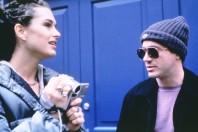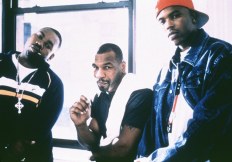|
Black and White
|
| |
 |
USA,
1999. Rated R. 98 minutes.
Cast: Bijou Phillips, Robert Downey
Jr, Oli "Power" Grant, Raekwon, Ben Stiller, Brooke Shields, Mike Tyson,
Allan Houston, Claudia Schiffer, William Lee Scott, Eddie Kaye Thomas,
Elijah Wood, Joe Pantoliano, Scott Caan, Jared Leto
Writer): James Toback
Music: Various artists, including
Raekwon and the American Cream Team
Cinematographer: David M. Ferrara
Producers: Daniel Bigel, Mike Mailer,
Ron Rotholz
Director: James Toback
|
| Grade: C+ |
Review
by Jeff Vorndam |
 ames Toback's
new film Black and White is like a mix tape loosely organized around
a central theme. There are some tracks that take off and soar and others that
never leave the ground. The opening salvo is an attention-grabbing scene that
is supposed to shock us, but feels like a borrowed riff–didn't Spike Lee include
a two white girls and black guy sex scene in He
Got Game? No matter, Toback appropriates it as if it were a groundbreaking
moment in cinema, an opening of the floodgates. Like a mix tape, the film is
all about the juxtaposition of divergent types. By sliding an improvised scene
next to a heavily scripted one and dropping in a mishmash of professional actors
and celebrity novices, Toback creates an atomic cocktail of unpredictability.
Every other scene is great or horrible. Questions are raised but never answered.
Toback provokes and is then content to wander away. Black and White never
gels into anything revelatory or sits still long enough to capture an idea and
nail it down. It ends up being a more interesting film to talk about than to
actually watch.
ames Toback's
new film Black and White is like a mix tape loosely organized around
a central theme. There are some tracks that take off and soar and others that
never leave the ground. The opening salvo is an attention-grabbing scene that
is supposed to shock us, but feels like a borrowed riff–didn't Spike Lee include
a two white girls and black guy sex scene in He
Got Game? No matter, Toback appropriates it as if it were a groundbreaking
moment in cinema, an opening of the floodgates. Like a mix tape, the film is
all about the juxtaposition of divergent types. By sliding an improvised scene
next to a heavily scripted one and dropping in a mishmash of professional actors
and celebrity novices, Toback creates an atomic cocktail of unpredictability.
Every other scene is great or horrible. Questions are raised but never answered.
Toback provokes and is then content to wander away. Black and White never
gels into anything revelatory or sits still long enough to capture an idea and
nail it down. It ends up being a more interesting film to talk about than to
actually watch. 
The watchability quotient is low in Black and White due to a lackluster
plot that kicks in as late as possible into the film, and then provides more
of a distraction than a framework for Toback's ideas. For the most part, the
film eschews narrative. There are recurring characters, and people from one
scene bump into people from another scene. The loosely associative style keeps
the film hopping, like we're watching an experiment in action. We hang out with
Charlie (Bijou Phillips) first. She's what you'd call a "wigger," I guess–a
white teenager infatuated with black culture so much that she gloms all she
can from it, aping everything she sees. Much to the dismay of her parodistic
white-bread parents, she and her friends spend their time horning in on the
entourage of Rich Bower (Oli "Power" Grant), a reputed ganglord trying to get
into the "legitimate" record industry. Charlie's teenage boyfriend Marty (Eddie
Kaye Thomas) has an older brother Will (William Lee Scott) who works for Bower.
Will is an obsequious white homeboy, anxious to prove to Bower that he's as
hard and tough as any of the brothers in his entourage. Marty and Will both
happen to be sons of the District Attorney (Joe Pantoliano). This should set
off warning bells that one of these boys is going to get in trouble and will
need his father to bail him out.
Charlie, Marty and the gang are approached by a digital video documentarian
named Sam Donager (Brooke Shields) who wants to follow the kids around as they
jump between the worlds of Long Island affluence and the hipper proving grounds
of Bower and his hip-hop protégé Cigar (Raekwon). Sam is married
to the openly gay Terry (Toback stalwart Robert Downey Jr.), only she seems
to be the only person in the film who doesn't recognize his sexuality, even
after Terry hooks up with Charlie's teacher Casey (Jared Leto). These connections
are meant to be this confusing and multilayered–everyone knows each other through
someone–I'm probably only four degrees from Raekwon myself. When we all essentially
know each other, or know someone who knows someone, our cultural and societal
gaps seem all the more ridiculous and outmoded.
Using the documentarian as a stand-in for his own questions, Toback
stages several scenes as point-blank interviews with talking heads spouting
different philosophies on the attraction of whites to black lifestyles
and vice versa. Charlie glibly states that she's a kid in America and can
do whatever she wants. It's the "because it's there" philosophy. This mystifies
a young African-American girl in the film, who says that all her friends
are trying to get out of the gangster lifestyle, trying to get educated,
hoping to make some money and leave their neighborhood. She can't
understand why anyone would willingly seek out an existence she sees as
unnecessarily dangerous and full of hardship. Rich Bowers is equally at
a loss. He surmises that whites must be after some type of "life force"
from him, some extra capability that he has but they don't. For him, whites
are an entrepreneurial opportunity. The record business is something to
be exploited. His friend Dean's (Allan Houston) girlfriend Greta (Claudia
Schiffer) is worth screwing so he can "get her information." This translates
as, find out what makes her so successful financially.
If I omitted introducing the characters of Dean and Greta, as well as a shady
character Mark Clear (Ben Stiller), it's because their storyline is dumped in
the middle of the freewheeling essay on race exchange with little previous introduction.
Dean is a college athlete at a small-time school who is approached by Mark Clear
to throw a basketball game. His decision ends up affecting all the previously
mentioned characters in the story in a forced connection that doesn't have the
jazzy flow of the earlier scenes. The Dean/Greta/Mark/Power subplot ends up
hijacking the entire movie and trading in melodrama for the improvisational
reality of the other scenes. The best scene in the movie, a wispy Robert Downey
Jr. baiting the paroled Mike Tyson, is followed by one of the worst–an earnest
soul-searching scene with Allan Houston. The former scene feels like it could
fly off the screen and tumble into the audience; the latter scene's words are
stapled all over Houston's inexpressive face.
James Toback hasn't put it all together since his underrated classic Fingers
(1978). In that film he told a deeply personal story that was harsh and
unforgiving to its autobiographical protagonist. Though Toback makes a cameo
appearance in Black and White, his on-screen persona this time around
is Ben Stiller, who doesn't quite get the handle on the desperation and failure
that Harvey Keitel did in Fingers or James Caan did in The Gambler.
Those guys were manic and virile extensions of Toback. Stiller is just another
song on side B of Toback's tape. With James Toback, you can tell when he's creating
a film that's essential to him. His energy is an unseen character toting a movie
camera. Black and White feels like a half-baked project, bursting with
ideas that never come to fruition. If you're inclined and patient, it will challenge
you think, but if it lost you once the plot machinations strangled its rhythms,
then it will be as welcome and memorable as a mix tape of Milli Vanilli.
Review © April
2000 by AboutFilm.Com and the author.
Images © 1999
Artisan Entertainment.


